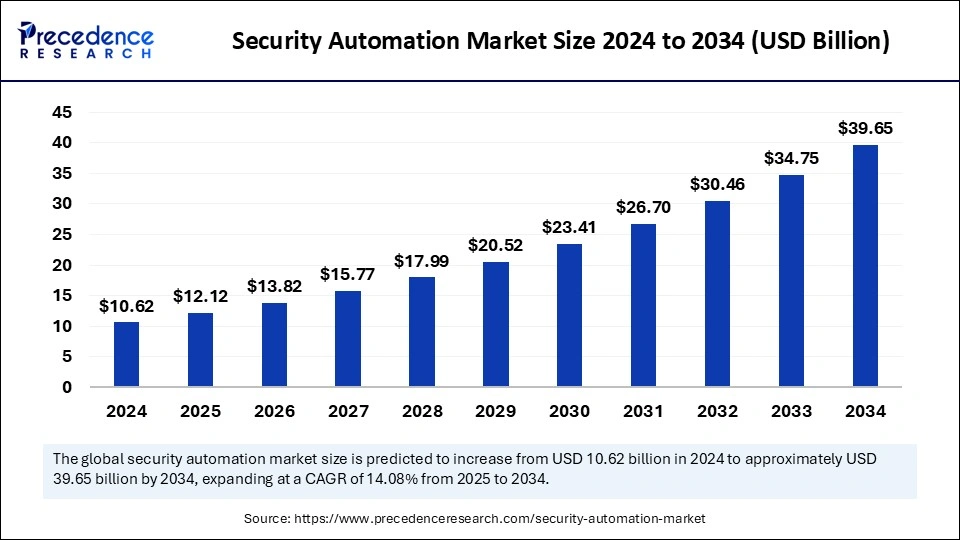The global security automation market size was predicted to increase from USD 10.62 billion in 2024 and is estimated to cross around USD 39.65 billion by 2034 with a CAGR of 14.08%.

Get Sample Copy of Report@ https://www.precedenceresearch.com/sample/5713
Key Insights
- North America emerged as the top contributor to the security automation market with a 36% share in 2024.
- Asia Pacific is expected to register the fastest CAGR of 15% during the forecast period.
- The solutions category dominated the market, capturing 65% of the total share in 2024.
- The services category is projected to grow at the highest CAGR throughout the study period.
- Cloud deployment was the preferred mode, leading the market in 2024.
- The on-premise deployment model is expected to expand significantly in the upcoming years.
- Endpoint security was the leading application segment in 2024.
- Incident response management is likely to witness significant growth over the forecast period.
- The full-code segment secured the largest share of the market in 2024.
- The no-code segment is anticipated to grow at the highest CAGR in the coming years.
- The BFSI sector was the largest vertical in the market in 2024.
- The healthcare and life sciences industry is forecasted to experience the fastest growth.
- AI & ML emerged as the leading technology in 2024.
- The UEBA segment is set to witness considerable growth in the future.
The Role and Impact of AI on the Security Automation Market
1. Enhancing Threat Detection and Response
AI plays a crucial role in improving threat detection and response mechanisms in security automation. Machine learning algorithms analyze vast amounts of data in real time, identifying patterns and anomalies that may indicate cyber threats. AI-driven security automation helps organizations detect, analyze, and respond to cyberattacks faster, reducing the risk of breaches. By automating incident response, AI minimizes human intervention, ensuring a swift and accurate reaction to potential threats.
2. Strengthening Endpoint Security
With the increasing number of devices connected to networks, endpoint security has become a major concern. AI-powered security automation enables continuous monitoring of endpoints, detecting suspicious activities and potential vulnerabilities. By leveraging AI-driven behavioral analysis, security systems can predict and mitigate threats before they compromise critical systems. This proactive approach enhances the security posture of enterprises, reducing downtime and financial losses due to cyber incidents.
3. Automating Incident Management and Mitigation
AI significantly improves incident management by automating the detection, classification, and resolution of security threats. Security automation tools integrated with AI can prioritize alerts, reducing false positives and ensuring that security teams focus on critical threats. AI-driven security operations centers (SOCs) streamline the investigation process, allowing organizations to resolve security incidents efficiently. This automation not only increases operational efficiency but also reduces the workload on cybersecurity professionals.
4. Advancing Cloud Security Solutions
As more organizations migrate to cloud environments, AI is becoming essential for securing cloud-based infrastructures. AI-driven security automation solutions continuously monitor cloud applications, identifying misconfigurations and unauthorized access attempts. By utilizing AI-powered threat intelligence, cloud security solutions can detect and prevent cyber threats in real time. This enhances data protection and ensures compliance with regulatory requirements in cloud environments.
5. Improving Identity and Access Management (IAM)
AI is transforming identity and access management by enabling real-time authentication and fraud detection. AI-powered security automation solutions use biometric authentication, behavioral analytics, and AI-driven risk assessments to verify users and prevent unauthorized access. AI also helps organizations implement zero-trust security models, ensuring that only authorized individuals have access to sensitive data and systems. This strengthens overall security and minimizes the risk of data breaches.
6. AI-Driven Security in Financial and Healthcare Sectors
Industries such as banking, financial services, and healthcare are increasingly relying on AI-powered security automation to protect sensitive customer data. AI enhances fraud detection by analyzing transaction patterns and identifying suspicious activities in real time. In healthcare, AI-driven security automation ensures compliance with data protection regulations by safeguarding electronic health records (EHRs) and medical devices from cyber threats. These advancements improve the security and trustworthiness of critical industries.
7. Predictive Security and Risk Management
AI enables predictive security by analyzing historical data and identifying emerging threats before they materialize. Security automation tools powered by AI can forecast cyber risks, allowing organizations to take proactive measures to mitigate potential threats. AI-driven risk assessments help businesses develop robust cybersecurity strategies, minimizing vulnerabilities and ensuring a resilient security infrastructure.
Also Read: Marine Onboard Communication and Control Systems Market
Market Scope
| Report Coverage | Details |
| Market Size by 2034 | USD 39.65 Billion |
| Market Size in 2025 | USD 12.12 Billion |
| Market Size in 2024 | USD 10.62 Billion |
| Market Growth Rate from 2025 to 2034 | CAGR of 14.08% |
| Dominating Region | North America |
| Fastest Growing Region | Asia Pacific |
| Base Year | 2024 |
| Forecast Period | 2025 to 2034 |
| Segments Covered | Offering, Deployment Mode, Application, Code Type, Vertical, Technology and Regions. |
| Regions Covered | North America, Europe, Asia-Pacific, Latin America, and Middle East & Africa |
Market Dynamics
Market Dynamics and Growth Factors
The security automation market is expanding due to the increasing need for organizations to safeguard their digital assets. Businesses are moving towards AI-driven security solutions that provide automated threat detection and incident response. Rising cybersecurity threats, regulatory requirements, and growing cloud adoption are driving enterprises to implement security automation tools. Additionally, companies are leveraging automation to reduce dependency on manual processes, improve operational efficiency, and minimize response time to security breaches.
Future Prospects and Emerging Business Opportunities
The market is poised for significant expansion with advancements in AI, big data analytics, and behavioral monitoring. The adoption of zero-trust security models and cloud-based security solutions presents new opportunities for vendors in the security automation space. Enterprises are also investing in automated security orchestration, incident response platforms, and AI-powered security analytics to enhance cybersecurity resilience. With the increasing shift towards digital transformation, companies are likely to invest more in proactive security automation strategies.
Industry Challenges and Adoption Barriers
Although security automation offers numerous benefits, several challenges hinder its widespread adoption. The high cost of implementation and maintenance can be a barrier for smaller enterprises. Additionally, concerns about false positives, AI biases, and vulnerabilities in automated security systems pose risks to businesses. Many organizations also face challenges in integrating automation into legacy security systems without disrupting existing operations. Addressing these challenges will require continuous improvements in AI-driven security automation tools.
Regional Insights and Market Expansion
North America leads the global security automation market, driven by increased cybersecurity spending and technological advancements. The Asia Pacific region is witnessing rapid adoption due to growing cyber risks and a surge in digitalization efforts. Europe remains a key region with strict regulatory frameworks promoting security automation adoption. The Middle East and Africa are gradually embracing security automation as businesses recognize the importance of cybersecurity investments. Meanwhile, Latin America is emerging as a potential market with increasing cybersecurity awareness and infrastructure development.
Security Automation Market Companies
- Cisco Systems, Inc.
- CrowdStrike
- CyberArk Software Ltd.
- IBM Corporation
- Palo Alto Networks
- Red Hat, Inc.
- Secureworks, Inc.
- Splunk Inc.
- Swimlane Inc.
- Tufin
Segments Covered in the Report
By Offering
- Solutions
- SOAR
- XDR
- SIEM
- Services
- Professional Services
- Managed Services
By Deployment Mode
- Cloud
- On-premises
By Application
- Network Security
- Firewall Management
- Intrusion Detection & Prevention System
- Network Traffic Analysis
- Network Access Control
- Others
- Endpoint Security
- Threat Detection and Prevention
- Configuration Management
- Malware Detection and Protection
- Phishing and Email Protection
- Others
- Incident Response Management
- Incident Triage and Escalation
- Evidence Gathering
- Incident Categorization and Prioritization
- Workflow Orchestration
- Others
- Vulnerability Management
- Prioritization
- Vulnerability Scanning and Assessment
- Patch Management and Remediation
- Vulnerability Remediation and Ticketing
- Others
- Identity & Access Management
- Single Sign On (SSO)
- User Provisioning and Deprovisioning
- Access Policy Enforcement
- Multi-factor Authentication
- Others
- Compliance & Policy Management
- Automated Compliance Auditing
- Audit Trail Generation
- Regulatory Compliance Reporting
- Policy Enforcement Automation
- Others
- Data Protection & Encryption
- Encryption Key Management
- Data Loss Prevention
- File and Database Encryption
- Others
By Code Type
- No Code
- Low Code
- Full Code
By Vertical
- Manufacturing
- BFSI
- Healthcare & Life Sciences
- Media & Entertainment
- Energy & Utilities
- Retail & E-commerce
- Government & Defense
- IT & ITES
- Others
By Technology
- AI & ML
- Predictive Analytics
- Robotic Process Automation (RPA)
- User & Entity Behavior Analytics (UEBA)
- Others
By Geography
- North America
- Europe
- Asia Pacific
- Latin America
- MEA
Ready for more? Dive into the full experience on our website@ https://www.precedenceresearch.com/
